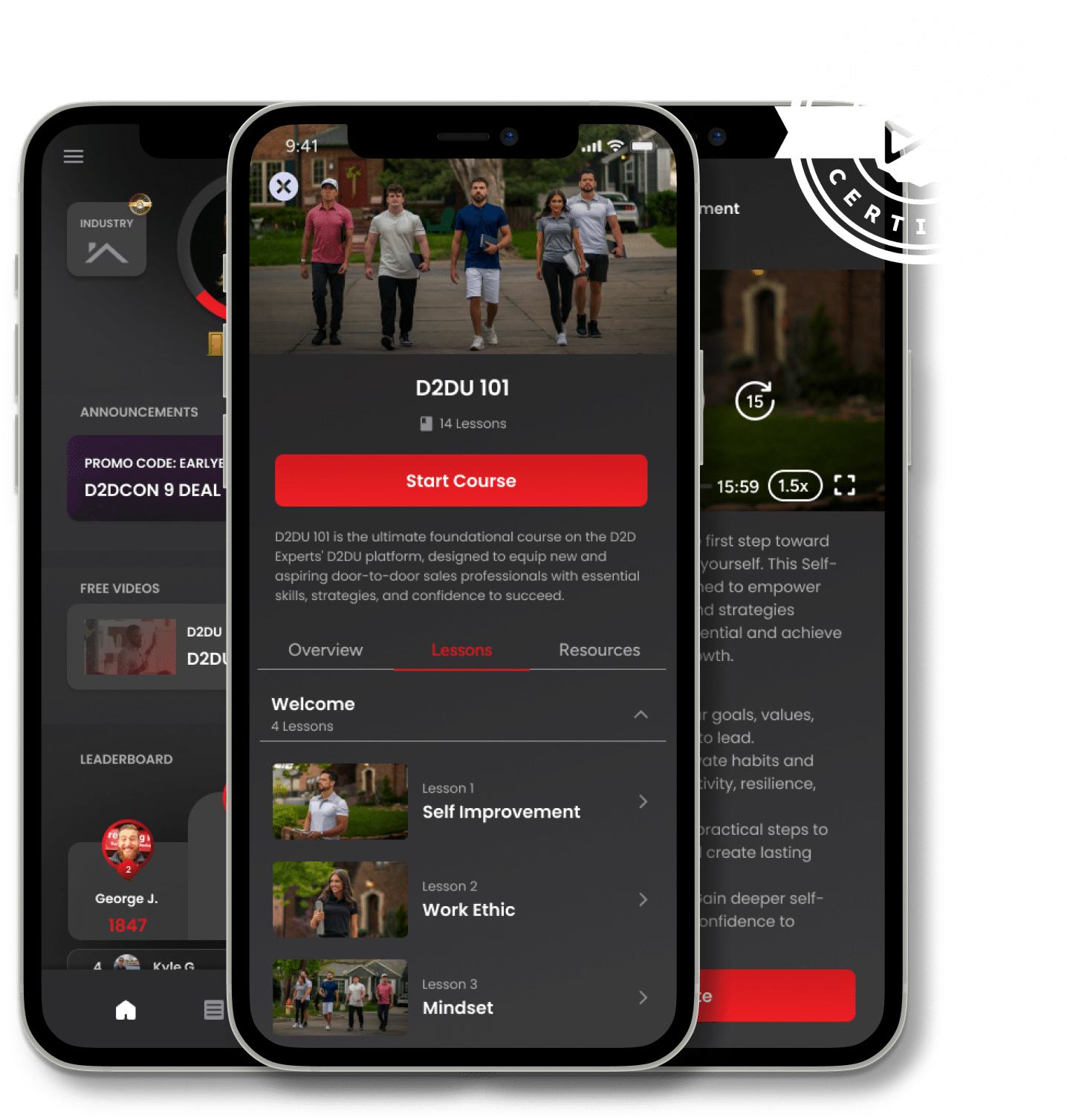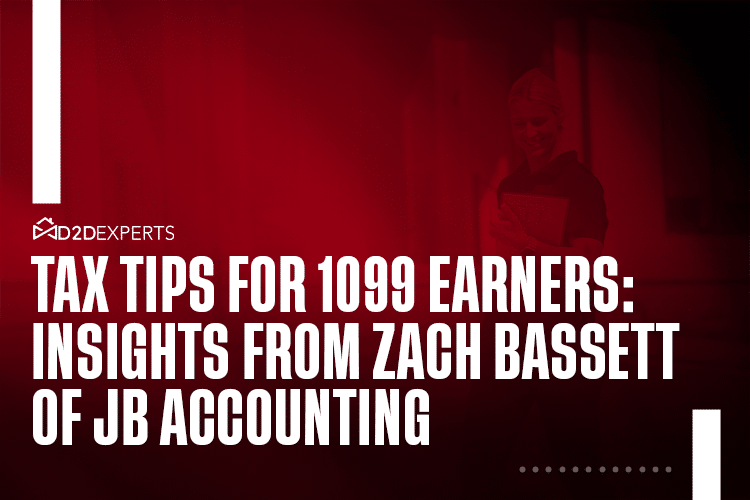Alright, let’s talk real talk. You’re out there crushing it door-to-door, maybe pulling in serious cash – awesome! But here’s the catch: that 1099 you get means Uncle Sam sees you as a business, and if you’re not careful, he’s gonna take a huge bite out of your hard-earned commissions. We’re talking the dreaded 15.3% self-employment tax on top of regular income tax. Ouch.
Too many reps make bank, then get absolutely hammered come tax time because they didn’t have a game plan. Sound familiar? Maybe you got a surprise bill like I did back on my mission in Argentina (long story, don’t recommend it!).
But guess what? Being 1099 isn’t just a burden; it’s an opportunity… if you play it smart. That’s why I sat down with Zach Bassett from JB Accounting. This guy isn’t your average number cruncher; 95% of his clients are D2D or direct sales hustlers like you. He lives and breathes this stuff.
So, you’re crushing it as a 1099 sales pro and maybe you’ve even followed expert tax advice (like the tips below!) to minimize what you owe Uncle Sam. Fantastic! But what happens when those perfectly legal write-offs make it tough to qualify for a mortgage? Sam Taggart sits down with John Hasebi from Cross Country Mortgage to discuss this exact challenge and a unique loan product designed specifically for high-earning 1099 professionals like you. Check out their conversation, then dive into those essential tax strategies…
Zach dropped some serious knowledge bombs – five tips that can literally save you thousands (tens of thousands, even!) and help you keep more money in your pocket. Forget TurboTax guesswork; let’s dive in.
Take Control of Your 1099 Taxes & Finances
Get expert guidance tailored for door-to-door professionals to maximize savings and build wealth.

Tip #1: Ditch Your Uncle Bob (Find a Real D2D Accountant)
Seriously. Your buddy’s dad who does taxes on the side? Your uncle who works at H&R Block? They probably mean well, but they likely don’t understand the unique world of door-to-door sales. And that ignorance is costing you money.
The 1099 Disadvantage: Without the right structure, you’re paying that full 15.3% self-employment tax on all your profit. A specialist knows how to legally minimize that.
The S-Corp Secret Weapon: Heard of an S-Corporation? If you’re profiting over $60k-$70k, this is HUGE. Instead of paying self-employment tax on everything, you pay yourself a “reasonable salary” (taxed) and take the rest as distributions (NOT subject to self-employment tax). Zach dropped an example: $100k profit could mean $12,000 saved. Annually. Let that sink in.
Past Mistakes = Future Refunds? Zach’s team often finds money for new clients by reviewing past returns filed incorrectly by other accountants. They can sometimes backdate S-Corp status and get you cash back!
Don’t Be Cheap: Spending a few bucks on a specialized accountant who saves you $12,000 isn’t an expense; it’s an insane ROI. Zach even saved one client $27,000 whose dad worked at a Big Four accounting firm because the dad didn’t specialize!
Tip #2: Track Your Expenses Like a Boss (It’s Free Money!)
Think expense tracking is boring? Think again. It’s literally finding free money the IRS wants you to take (if documented).
Get an App: Zach digs QuickBooks Self-Employed. It automates mileage tracking (yes!), lets you snap pics of receipts, and helps categorize everything. No more shoeboxes!
Mileage > Gas: Stop just writing off gas! The standard mileage rate is where the real money is. Driving 20,000 miles? That could be over a $10,000 deduction! Track every business mile – territory driving, meetings, bank runs, everything.
Per Diem Power: Traveling for work (hello, summer sales)? Instead of saving every fast-food receipt, use the IRS per diem rate for meals in that city (e.g., $74/day in LA). It often adds up to way more, even after the 50% limit.
Don’t Forget: Summer housing rent/utilities, logoed gear you trash, phone bills, software, training – it all adds up!
Tip #3: Play Tax Chess, Not Checkers (Strategy is King)
Getting the best tax outcome isn’t just about deductions; it’s about a smart game plan that matches your life goals.
Talk to Your Accountant! Buying a house next year? Planning to take time off? Your accountant needs to know. Slamming every possible deduction might look great on paper but could kill your chances of getting a mortgage if your reported income is too low.
S-Corp Smarts: It’s not just if you have an S-Corp, but how you use it (like setting that reasonable salary) based on your goals.
Teamwork Makes the Dream Work: Get your accountant, financial planner, and maybe real estate advisor on the same page. Avoid getting pushed into high-commission products (like some insurance) that benefit the advisor more than you.
Tip #4: Master Your Deadlines (Don’t Poke the IRS Bear)
Missed deadlines = stupid penalties and mounting interest. The IRS will get their money.
Quarterly Payments: Yeah, you probably need to pay taxes four times a year. Plan for it.
S-Corp Filings: Got that S-Corp? You MUST file quarterly payroll reports (like Form 941) even if you paid yourself zero dollars. Ignore this, and bam – penalties stack up fast. (Ask me how I know about penalty letters… facepalm).
IRS Mail Isn’t Junk Mail: Open it! Immediately! That confusing letter could be a warning before they levy your bank account. Send a pic straight to your accountant. Often, they can fix it or get penalties waived (maybe once!).
Extensions = More Time to FILE, Not PAY: Filing an extension gives you until October to file, but your tax payment is still due in April! 1 You gotta estimate and pay by the deadline, or face penalties.
Tip #5: Trust, But Verify (Keep Your Accountant Honest)
You hired an expert, great! But remember: YOU are signing that tax return. YOU are responsible for what’s on it.
Does it Make Sense? Look it over. Ask questions. See a massive deduction for a truck you don’t own? Huge red flag!
Beware the “Too Good to Be True”: Some shady preparers might promise insane refunds by taking illegal deductions. If caught, the fraud falls on you.
Get a Second Opinion: Especially if you’re unsure about your current tax person. A specialist like Zach can often glance at your return (for free!) and spot red flags or missed opportunities in minutes. What have you got to lose?
Take Control of Your 1099 Taxes & Finances
Get expert guidance tailored for door-to-door professionals to maximize savings and build wealth.

Wrapping Up: Take Control!
Look, taxes as a 1099 rep can feel daunting, but they don’t have to be scary. With the right knowledge and the right specialized help, you can navigate the system, keep way more of your money, and use those savings to build real wealth. Stop leaving cash on the table or living in fear of the IRS. It’s time to get smart about your money.


